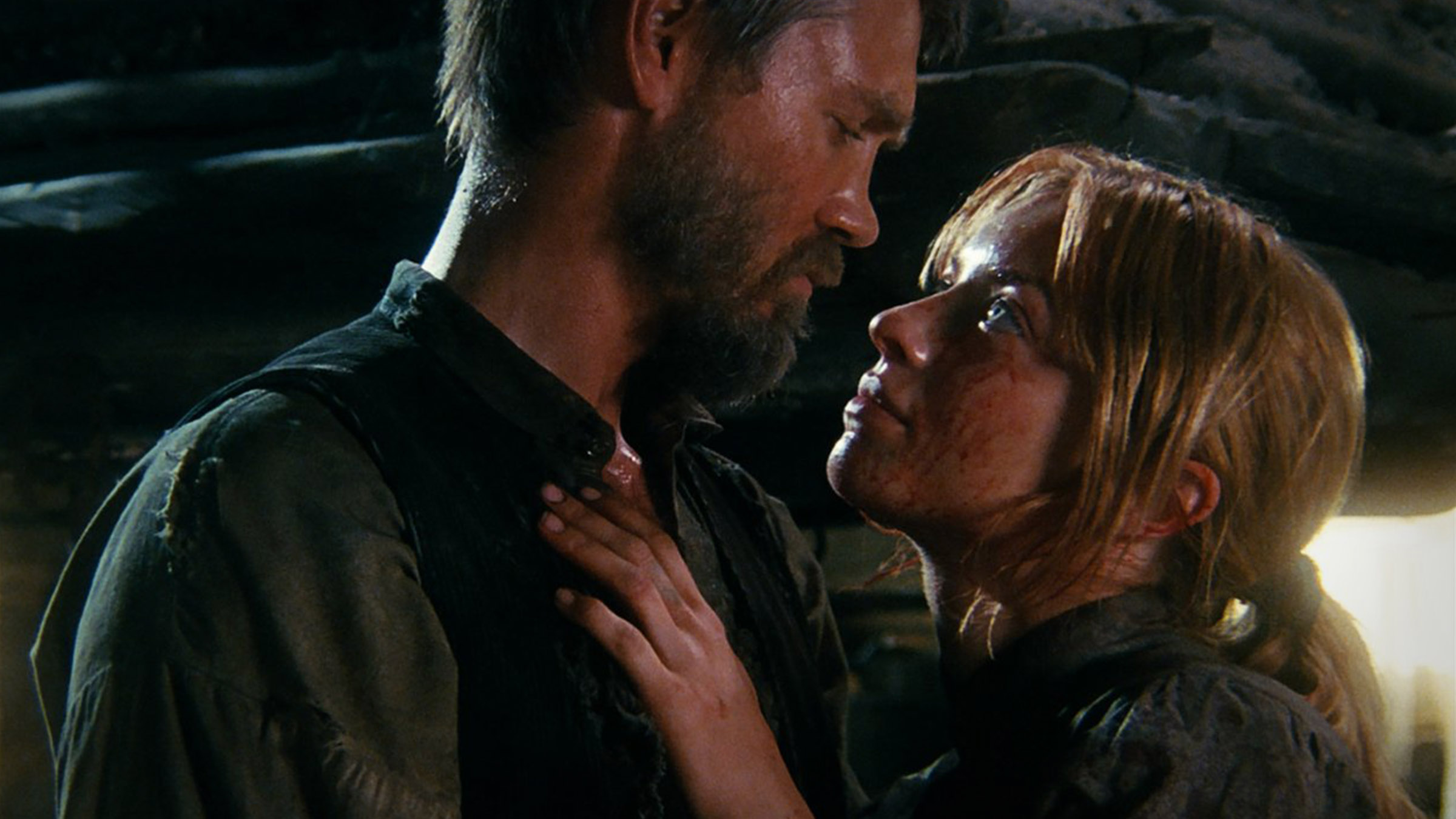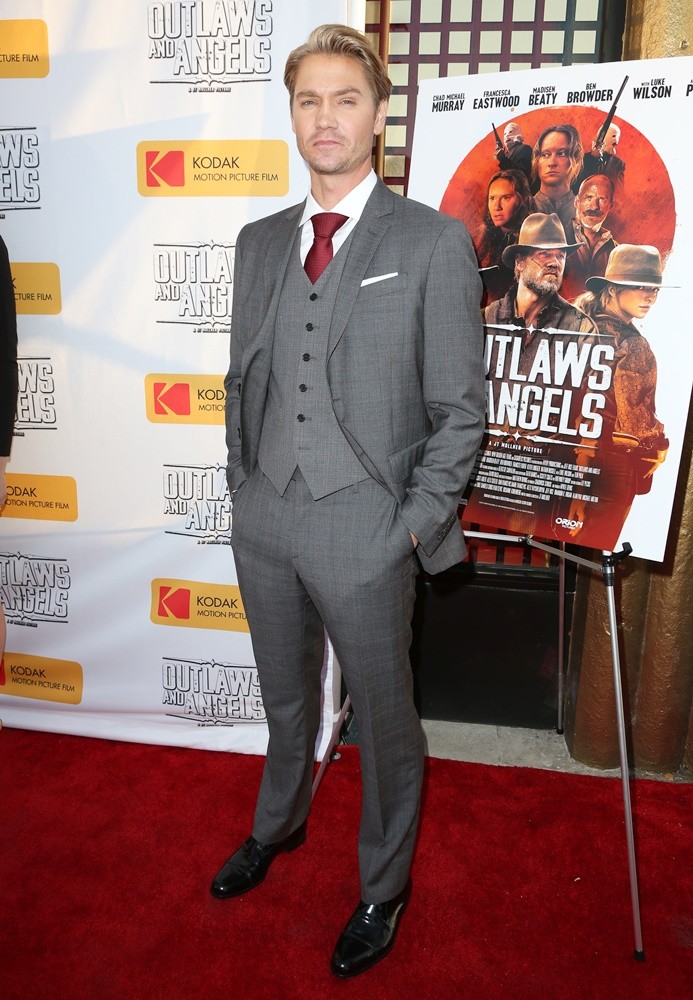Chad Michael Murray Plays Redemptive Outlaw Henry in Indie Western Outlaws and Angels
Heavy dialogue, intimate camera angles and intense acting chops are just a few of the things present in JT Mollner’s Indie-Western flick, Outlaws and Angels, in theaters July 15. After a successful premiere at this year’s Sundance Film Festival, this violent and disturbing nod to the Wild West has been highly talked about by critics and fans alike.


Chad Michael Murray stars as Henry, a tactful, redemptive leader of a group of outlaws on the lam. Although a departure from some of Murray’s previous roles, his acting was confident and emotive in a way that reflected the script’s dark, raw elements. “Henry is an outlaw who is a little bit long in the tooth,” he told Parade.com. “Outlaws back then didn’t live very long—they were being killed off in their teens, twenties. Being forty and being an outlaw means he’s been doing it well and he’s a survivalist.”
In a western that breaks all the traditional rules—emphasizing sex over loyalty, and set in a confined cabin rather than the great outdoors—Murray felt right at home. “It was awesome, just an incredible experience,” he raved.
However, Murray’s greatest accomplishment so far doesn’t involve the entertainment industry. His son, born June 2015, recently turned one. When discussing fatherhood, he noted, “Boy did life change, and it changed in the most beautiful way.”


Parade.com chatted with Murray on his first impressions of the Outlaws and Angels script, his favorite character relationship in the film, and his first year of being a family man.
What was your first thought when you received the script?
When I first received the script, it was about 5:30 on a Friday night. They gave me the script and said, “Hey, can you take this to a meeting tomorrow at 11:00?” My wife and I had just had our son, and I was going back to work on Agent Carter in two months, so I was taking time off. I wasn’t really looking for anything and I was like, “It’s Friday night, I don’t want to read this!” [laughs]. Then, around midnight, I picked up the script and I couldn’t put it down. It was unbelievable. I woke my wife up an hour later and said, “I have to do this film.” I just saw the picture so clearly in my head. Henry [my character] spoke to me so clearly. The story and all the subtext grabbed me. I ended up going into that meeting the next morning at 11:00 am, and I literally just looked at them and said “Look, I’ve never said this before but I have to do this film.” JT [Mollner, the director] and I speak the same language, and so I understood the story and the idea of what he was trying to get across. Because we connect on those levels, is why this has taken place.


You play ring-leader Henry. Tell us about your character.
Everything about Henry, for me, was the creation of a man. How would he walk? How would he talk? How would he feel? Where would he hurt in his body? He would obviously save every bit of energy he possibly could, so movement would be slim, so he’s always ready to fight and keep himself going. The man was on the move; he couldn’t stay still for too long. It was very interesting to develop Henry. His story is that he’s an outlaw in a band of misfits that just robbed a bank, and the U.S. marshal’s are hunting them down. And, as they’re running toward Mexico, their horses die off and now they’re footing it. They seek shelter in a cabin in the middle of nowhere, and what they discover inside the cabin is far more disturbing than they ever could have imagined. That’s where the story takes place.

Viewers may be surprised to see you in a role so dark and violent. Was this a welcome change for you?
I love the opportunity always to challenge myself, and push myself to be, basically, scared. I want to do projects that I’m afraid of because that’s going to keep me creatively flowing. It can get stagnant if you’re doing a lot of the same thing day in and day out. In order to fuel the creativity, I just really have to be doing things that are moving, different and very character-driven. Sometimes it’s risky. You’re taking big chances, doing things that are a large departure from who you are. I may fall flat on my face, or maybe not, who knows. But at the same time, it’s what I love, it’s what I really enjoy. At the end of it all, I just hope and pray that the fans that have been with me for so long—17 years…holy cow—will appreciate the love and the work that goes into doing things like this. I really dug the whole experience, one of the best film experiences for me, period."
Is there any moment in filming that really sticks out for you?
Oh my god, there’s so many. The whole experience was incredible because with this cast, everybody showed up because they wanted to be there, not for a paycheck, not for anything else. They all just really wanted to do the work. Everyone was a full on character. Everyone was a huge departure from who they were. Teri Polo and Ben Browder—you see them and they’re just incredible, they’re not the stereotypical characters that they’ve ever done before, and they truly gave nuanced, intense performances. Everybody was so collaborative that we could work off each other and really hammer these scenes home to make them as best as possible and make them sing. It was an honor and very flattering to work with these guys.


This western is different, because the majority of the filming takes place indoors—in one room, in fact—rather than emphasizing the vast landscape. Did you feel confined?
No, not at all. I liked the authentic qualities to it and what it makes you feel. It does a lot of the work for you. When you get done in hair and makeup and you’re rocking an unbelievable wardrobe that puts you in the era, and you’re dirty and you’re grimy and you’re out there in 100-degree heat in Santa Fe and you’re shooting in a cabin in the middle of nowhere, you just submerse. You’re in it. What JT [Mollner] does so well is one, he’s an impeccable leader, but two, he really let’s you find what you want to find. That’s how I like to work, is to find the scene and start really minimizing moments and creating different things throughout the show, and JT [Mollner] was great. We would just bounce things off each other all the time, and it was forever growing and always flowing.
Which character relationship did you most enjoy seeing evolve throughout filming?
I love the character of Joe. He’s a big guy, Keith Loneker plays him, and Keith was just so incredible. We created such a bond and a friendship throughout this film, that our character relationship kept growing and growing. I wish we could have done an entire movie that was just called “Henry and Joe” to be honest [laughs]. I love that relationship so much. But, I think that what you’re really focused on is the redemption that Henry’s seeking, and the redemption that Florence [Francesca Eastwood’s character] is seeking, and that’s really where the story takes place.

This film puts sex in the forefront, rather than the traditional Western characteristics of honor and conquering the landscape. What was it like acting this racy-for-a-Western, somewhat controversial script?
I think that’s what’s beautiful about it. It’s not your stereotypical Western. It’s a story that technically could be told right now, in modern-day, contemporary Los Angeles. It’s the same exact content that we still see today. The Western theme happens to be a beautiful backdrop and an incredible character to set the stage. That’s what I really like about it. It’s not your good guy, bad guy, money, robbing banks, on the hunt, all that other stuff [type of film]. That plays into it, but at the same time, it’s a much darker world of deep-seated hate and lust. Our brutality is not gratuitous by any means, it’s actually all well-intended. It’s a specific story that moves the door forward instead of bringing it back to a screeching halt-angle. You fall in love with these characters and you really go on the journey with them. So when these [darker] instances occur, they’re more impactful.
Did you have to undergo any preparation for the role, such as learning to ride a horse or shoot a rifle?
No, I do both those already [laughs]. I’m pretty good with a gun, and I’m pretty good on a horse. If it was anything, it was actually teaching other people. Poor Keith Loneker, he couldn’t ride a horse, so I was kind of guiding him. I showed Fran [Francesca Eastwood] how to shoot. From day one, I said, “Keep this on you at all times, constantly play with it, I’ll give you a few little things to do so you can get really good with it.” She took that note, just played and she was great. For me, it was really just delving into who Henry is, and developing his voice and developing who this man is, and doing a lot of script analysis.

Your son just turned one. How’s fatherhood?
Incredible. By far my greatest accomplishment. Perspective is the biggest thing that changes. You’re your strongest and your weakest all at the same time. You become the strongest you’ve ever been because you have something to fight for, and you also become your weakest because if you ever have that taken from you, you won’t know what to do with yourself. So, it’s been the most beautiful, unbelievable experience, and he’s just awesome. Running around like a little champ.


No comments:
Post a Comment